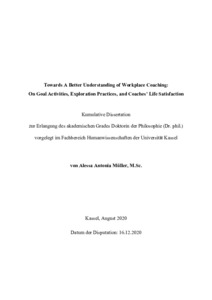Datum
2020Autor
Müller, Alessa AntoniaSchlagwort
150 Psychologie CoachingArbeitsplatzZufriedenheitPsychische BelastungSupervisionBerufspraxisMetadata
Zur Langanzeige
Dissertation

Towards A Better Understanding of Workplace Coaching: On Goal Activities, Exploration Practices, and Coaches’ Life Satisfaction
Zusammenfassung
Whereas there is a high and ever-increasing demand for coaching worldwide (International Coach Federation, 2016) and meta-analytical findings suggest that coaching is generally effective (e.g., Jones et al., 2016; Sonesh, Coultas, Lacerenza et al., 2015), little is still known about standards for “good” coaching practice (e.g., Bono et al., 2009; Vandaveer et al., 2016). Across three studies, this dissertation investigates relevant facets of coaching practice. It addresses the questions of how coaches practice workplace coaching and how their coaching practice in turn relates to their life satisfaction.
Study 1 addresses the question of the relevance of goal activities in workplace coaching. A systematic literature review was conducted to summarize the extant empirical findings on working with goals in coaching. The results of 24 studies that investigate (a) the occurrence of goal activities in workplace coaching and/or (b) the relationship between goal activities and coaching outcomes were synthesized. The findings indicate that goal activities take a wide range of different forms within coaching practice and research (e.g., goal setting, setting action/development plans, goal-focused relationship between coach and coachee). Coaches report working with goals frequently, while coachees report this occurring less frequently. Some study findings suggest a positive relationship between working with goals and coaching outcomes, whereas other studies report no significant association. Initial findings point to possible moderating variables (e.g., coachee characteristics, initiator of goal activity) and potential challenges in involving organizational stakeholders in goal activities.
Study 2 focuses on exploration practices in workplace coaching, more specifically, on methods that coaches utilize and topics that they address during the initial exploration of coaching engagements. German-speaking workplace coaches (N = 218) with various backgrounds completed an online survey. Five dimensions of exploration practices emerged: Exploration of the coachee’s (1) professional context (e.g., coachee’s professional position) and (2) personal context (e.g., coachee’s current family situation), using (3) standardized methods (e.g., personality inventories) and (4) active and creative methods (e.g., roleplaying), and (5) clarification of coaching issues and goals (e.g., exploration of “hidden” coaching issues). The coach’s background (i.e., gender, coaching experience, academic education, coach or psychotherapy training, and coaching approach) was analyzed to gain insight into how this relates to the reported exploration practices. Certain aspects of these
practices could be predicted by coaches’ coaching experience, their affiliation with certain coaching approaches (i.e., psychoanalytic/psychodynamic, cognitive-behavioral, transactional analysis, and neuro-linguistic programming), whether the coach holds a degree in social sciences/education and whether they attended coach training.
Study 3 concerns how satisfied workplace coaches are with their lives (i.e., job, leisure time, financial situation), the extent of their experienced mental strain related to their coaching practice, and whether coaching supervision influences coaches’ job satisfaction. An online survey (N = 110) was conducted. The findings indicate that workplace coaches were rather satisfied with their life and that they experienced relatively low work-related mental strain. However, if coaches experienced a high amount of work-related mental strain, use of supervision has a significant buffering effect on the coaches’ job satisfaction. It therefore seems that coaching supervision might be an effective reflective practice and useful strategy when it comes to coaches’ self-care.
Taken together, this dissertation strives to approach important and hitherto neglected areas of empirical research on coaching practice. The results of the respective studies are discussed and implications for different stakeholders are explored.
Study 1 addresses the question of the relevance of goal activities in workplace coaching. A systematic literature review was conducted to summarize the extant empirical findings on working with goals in coaching. The results of 24 studies that investigate (a) the occurrence of goal activities in workplace coaching and/or (b) the relationship between goal activities and coaching outcomes were synthesized. The findings indicate that goal activities take a wide range of different forms within coaching practice and research (e.g., goal setting, setting action/development plans, goal-focused relationship between coach and coachee). Coaches report working with goals frequently, while coachees report this occurring less frequently. Some study findings suggest a positive relationship between working with goals and coaching outcomes, whereas other studies report no significant association. Initial findings point to possible moderating variables (e.g., coachee characteristics, initiator of goal activity) and potential challenges in involving organizational stakeholders in goal activities.
Study 2 focuses on exploration practices in workplace coaching, more specifically, on methods that coaches utilize and topics that they address during the initial exploration of coaching engagements. German-speaking workplace coaches (N = 218) with various backgrounds completed an online survey. Five dimensions of exploration practices emerged: Exploration of the coachee’s (1) professional context (e.g., coachee’s professional position) and (2) personal context (e.g., coachee’s current family situation), using (3) standardized methods (e.g., personality inventories) and (4) active and creative methods (e.g., roleplaying), and (5) clarification of coaching issues and goals (e.g., exploration of “hidden” coaching issues). The coach’s background (i.e., gender, coaching experience, academic education, coach or psychotherapy training, and coaching approach) was analyzed to gain insight into how this relates to the reported exploration practices. Certain aspects of these
practices could be predicted by coaches’ coaching experience, their affiliation with certain coaching approaches (i.e., psychoanalytic/psychodynamic, cognitive-behavioral, transactional analysis, and neuro-linguistic programming), whether the coach holds a degree in social sciences/education and whether they attended coach training.
Study 3 concerns how satisfied workplace coaches are with their lives (i.e., job, leisure time, financial situation), the extent of their experienced mental strain related to their coaching practice, and whether coaching supervision influences coaches’ job satisfaction. An online survey (N = 110) was conducted. The findings indicate that workplace coaches were rather satisfied with their life and that they experienced relatively low work-related mental strain. However, if coaches experienced a high amount of work-related mental strain, use of supervision has a significant buffering effect on the coaches’ job satisfaction. It therefore seems that coaching supervision might be an effective reflective practice and useful strategy when it comes to coaches’ self-care.
Taken together, this dissertation strives to approach important and hitherto neglected areas of empirical research on coaching practice. The results of the respective studies are discussed and implications for different stakeholders are explored.
Zitieren
@phdthesis{doi:10.17170/kobra-202101072936,
author={Müller, Alessa Antonia},
title={Towards A Better Understanding of Workplace Coaching: On Goal Activities, Exploration Practices, and Coaches’ Life Satisfaction},
school={Kassel, Universität Kassel, Kassel, Fachbereich Humanwissenschaften},
year={2020}
}
0500 Oax
0501 Text $btxt$2rdacontent
0502 Computermedien $bc$2rdacarrier
1100 2020$n2020
1500 1/eng
2050 ##0##http://hdl.handle.net/123456789/12402
3000 Müller, Alessa Antonia
4000 Towards A Better Understanding of Workplace Coaching: On Goal Activities, Exploration Practices, and Coaches’ Life Satisfaction / Müller, Alessa Antonia
4030
4060 Online-Ressource
4085 ##0##=u http://nbn-resolving.de/http://hdl.handle.net/123456789/12402=x R
4204 \$dDissertation
4170
5550 {{Coaching}}
5550 {{Arbeitsplatz}}
5550 {{Zufriedenheit}}
5550 {{Psychische Belastung}}
5550 {{Supervision}}
5550 {{Berufspraxis}}
7136 ##0##http://hdl.handle.net/123456789/12402
<resource xsi:schemaLocation="http://datacite.org/schema/kernel-2.2 http://schema.datacite.org/meta/kernel-2.2/metadata.xsd"> 2021-01-13T10:13:44Z 2021-01-13T10:13:44Z 2020 doi:10.17170/kobra-202101072936 http://hdl.handle.net/123456789/12402 eng Urheberrechtlich geschützt https://rightsstatements.org/page/InC/1.0/ Coaching Workplace coaching Goal activities Systematic literature review Life satisfaction Mental strain Coaching supervision Initial exploration Coaching practice 150 Towards A Better Understanding of Workplace Coaching: On Goal Activities, Exploration Practices, and Coaches’ Life Satisfaction Dissertation Whereas there is a high and ever-increasing demand for coaching worldwide (International Coach Federation, 2016) and meta-analytical findings suggest that coaching is generally effective (e.g., Jones et al., 2016; Sonesh, Coultas, Lacerenza et al., 2015), little is still known about standards for “good” coaching practice (e.g., Bono et al., 2009; Vandaveer et al., 2016). Across three studies, this dissertation investigates relevant facets of coaching practice. It addresses the questions of how coaches practice workplace coaching and how their coaching practice in turn relates to their life satisfaction. Study 1 addresses the question of the relevance of goal activities in workplace coaching. A systematic literature review was conducted to summarize the extant empirical findings on working with goals in coaching. The results of 24 studies that investigate (a) the occurrence of goal activities in workplace coaching and/or (b) the relationship between goal activities and coaching outcomes were synthesized. The findings indicate that goal activities take a wide range of different forms within coaching practice and research (e.g., goal setting, setting action/development plans, goal-focused relationship between coach and coachee). Coaches report working with goals frequently, while coachees report this occurring less frequently. Some study findings suggest a positive relationship between working with goals and coaching outcomes, whereas other studies report no significant association. Initial findings point to possible moderating variables (e.g., coachee characteristics, initiator of goal activity) and potential challenges in involving organizational stakeholders in goal activities. Study 2 focuses on exploration practices in workplace coaching, more specifically, on methods that coaches utilize and topics that they address during the initial exploration of coaching engagements. German-speaking workplace coaches (N = 218) with various backgrounds completed an online survey. Five dimensions of exploration practices emerged: Exploration of the coachee’s (1) professional context (e.g., coachee’s professional position) and (2) personal context (e.g., coachee’s current family situation), using (3) standardized methods (e.g., personality inventories) and (4) active and creative methods (e.g., roleplaying), and (5) clarification of coaching issues and goals (e.g., exploration of “hidden” coaching issues). The coach’s background (i.e., gender, coaching experience, academic education, coach or psychotherapy training, and coaching approach) was analyzed to gain insight into how this relates to the reported exploration practices. Certain aspects of these practices could be predicted by coaches’ coaching experience, their affiliation with certain coaching approaches (i.e., psychoanalytic/psychodynamic, cognitive-behavioral, transactional analysis, and neuro-linguistic programming), whether the coach holds a degree in social sciences/education and whether they attended coach training. Study 3 concerns how satisfied workplace coaches are with their lives (i.e., job, leisure time, financial situation), the extent of their experienced mental strain related to their coaching practice, and whether coaching supervision influences coaches’ job satisfaction. An online survey (N = 110) was conducted. The findings indicate that workplace coaches were rather satisfied with their life and that they experienced relatively low work-related mental strain. However, if coaches experienced a high amount of work-related mental strain, use of supervision has a significant buffering effect on the coaches’ job satisfaction. It therefore seems that coaching supervision might be an effective reflective practice and useful strategy when it comes to coaches’ self-care. Taken together, this dissertation strives to approach important and hitherto neglected areas of empirical research on coaching practice. The results of the respective studies are discussed and implications for different stakeholders are explored. open access Müller, Alessa Antonia 2020-12-16 184 Seiten Kassel, Universität Kassel, Kassel, Fachbereich Humanwissenschaften Möller, Heidi (Prof. Dr.) Ohly, Sandra (Prof. Dr.) Coaching Arbeitsplatz Zufriedenheit Psychische Belastung Supervision Berufspraxis publishedVersion false </resource>
Die folgenden Lizenzbestimmungen sind mit dieser Ressource verbunden:
Urheberrechtlich geschützt
Verwandte Dokumente
Anzeige der Dokumente mit ähnlichem Titel, Autor, Urheber und Thema.
-
Negative effects for coaching clients and coaches and implications for their prevention
Dissertation
Graßmann, Carolin (2018-02-28)


